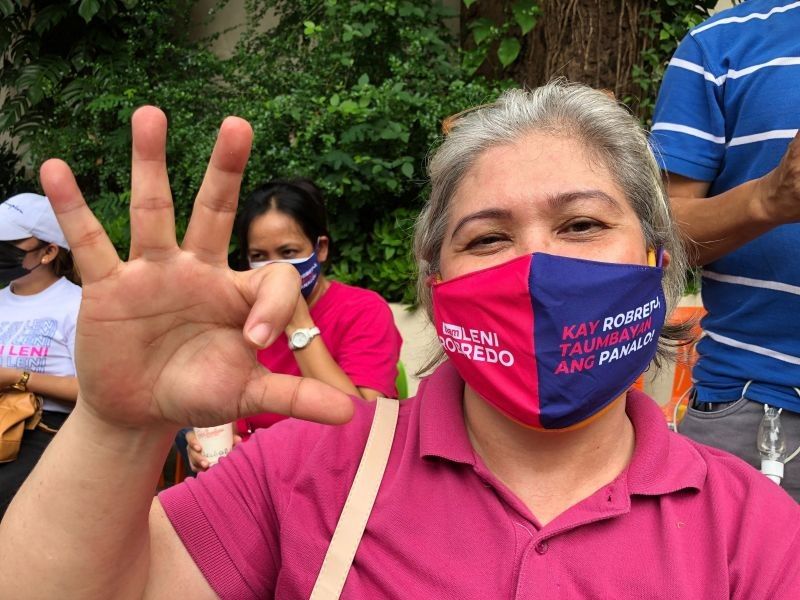Robredo’s supporters try to break through their echo chambers

MANILA, Philippines — When Vice President Leni Robredo announced her candidacy for president in the 2022 elections, pink photos flooded Facebook, while hashtags related to her bid for the highest office in the country dominated local Twitter trends.
It appears that Robredo has a solid — perhaps even formidable — following and yet she placed sixth among potential presidential candidates in the Pulse Asia survey conducted last month.
She was 12 points away from the leading personality in the poll, Davao City Mayor Sara Duterte-Carpio, and was behind Sen. Grace Poe, both of whom did not pursue a presidential run.
If support for Robredo appears to be so strong on social media, why has she been performing poorly in pre-election surveys?
“The people we see on our feeds are our friends, people we follow, and personalities that algorithms think are interesting for us,” said sociologist Nicole Curato in an email. “Our online communities do not mirror the rest of the Philippines.”
Political scientist Cleve Arguelles echoed this, pointing out that only a fraction of Filipinos are on social media, and even a tinier slice are on Twitter, where support for Robredo appears to be the strongest.
Wider, wilder world
It turns out that beyond the pink social media feeds is a wider, wilder world where Robredo is viciously criticized and maligned.
Robredo herself has admitted that while support for her has been overwhelming, more work needs to be done to reach out to the bulk of voters on social media who think poorly of her.
“The propaganda against me over the past five and a half years have been very successful… that this is the bulk of the voters and this is the bulk who think that I am no good at all,” she said at an event of the Rotary Club of Manila.
So it was not at all surprising that when Robredo announced her candidacy for president, she made this appeal to supporters: “Reach out beyond your usual circles, expand our ranks.”
“It’s really important that VP Leni’s campaign and the vice president herself, they know that the support so far that they’re getting is probably because of this echo chamber effect and the support they see on social media may not translate to support offline or on the ground,” Arguelles said.
He said that Robredo’s campaign might be picking up lessons from the doomed candidacies of the opposition’s senatorial candidates in the 2019 elections, where they emerged as the most talked about bets on social media — particularly on Twitter — only for them to suffer a stunning loss to administration candidates.
Conversion
Clyde Gregorio (no relation to author), co-convenor and spokesperson of volunteer group Dapat si Leni, said they acknowledge that they might just be preaching to the choir, but they are making efforts to reach out to the rest of the congregation.
“We emphasize that usually when we do our orientations that the fight here is not among our ranks because we’re already sold to the idea of a Leni Robredo presidency,” Gregorio said partly in Filipino.
“We always emphasize to our volunteers that we should always be concerned with conversion,” he added.
Gregorio said that one way they are doing this is by encouraging volunteers to speak with people who are not inclined to support Robredo.
Another way is by infiltrating online spaces like TikTok and YouTube, which Gregorio believes is a source of disinformation and “revisionist narratives.”
But conversion is easier said than done, Curato said, especially when dealing with voters with stubborn preferences.
“At best, one could aim to persuade undecided voters by appealing to what matters to them,” she said.
Liberal Party vice president Teddy Baguilat, who is among the senatorial candidates in the Robredo ticket, said they will try to capture those who neither identify as “dilawan” or supporters of his party, and “DDS” or supporters of President Rodrigo Duterte.
“I think, in order to win, you have to get those in the middle. Those neither identifying themselves as opposition or administration,” Baguilat said partly in Filipino.
Escaping the echo chamber
Then there’s also the trouble with echo chambers on social media, which Arguelles says are hard to escape from and drives polarization.
“The algorithm of these platforms itself, by its nature, it’s already designed to keep us in an echo chamber because in an echo chamber, we’re likely to be more happy to keep engaging, and then we drive traffic, we make social media platforms busy,” he said.
He said social media users must deliberately counter social media algorithms by keeping in touch with other political perspectives, including those that they do not like or agree with.
“If you don’t agree to a particular political position or the particular page, you don’t necessarily have to unfollow it or unfriend these people … because you will lose this whole universe of people with that particular perspective,” Arguelles said.
For Curato, people can escape echo chambers by finding non-political spaces where they can pursue hobbies and interests and nurture friendships.
“Learning about other people through their hobbies and interests enlarges our understanding of others. We get to know their stories and aspirations, anxieties and fears, which may help us understand why they believe a certain way,” she said.
- Latest
- Trending





























